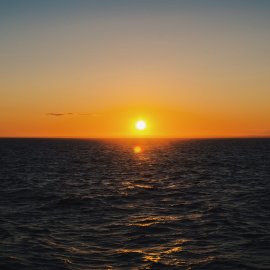An Ocean Ethos for a World That's Lost Its Way
-
English
-
ListenPause
WOR 395
An Ocean Ethos
I’m Peter Neill, Director of the World Ocean Observatory.
The world has lost its way. The physical and political turmoil we face in so many iterations and places are symptomatic of a failed system of values unable to support our environmental, social, economic, and political security.
Since the industrial revolution, we have placed our faith in an operative paradigm that promotes unlimited growth based on consumption and enabled by fossil fuels. But now the negatives of that historical vector seriously overwhelm the positives as manifest in the resultant environmental degradation and all the ancillary effects on air, land, and water pollution and the resultant global instability we see around us. The scientific community tells us so, and the market tells us so. The evidence of climate change and its pervasive and complicated impacts on how and where we live is incontrovertible. Suddenly we are all environmental refugees. The collapse of the price of oil, the glut of supply, the reliance by states and communities on a single means for generating revenue and employment – all of these, and more, are declarations of fact and failure that are inflicting real pain, disruption, and loss for economies, communities, and individuals the world over. The old value equation is bankrupt.
The fundamental question, then, is “what’s next?”
In my recently published book, THE ONCE AND FUTURE OCEAN, I suggest a new paradigm for the 21st century: managed growth based on sustainability, enabled by the ocean and the movement of water – from ocean to atmosphere to land and watershed to ocean and round again – the circles and cycles of conveyance that nurture our world and hold the key to our survival. I call this “hydraulic society.” We have all learned the “water cycle” in our first science class, and we teach it still as a fundamental explanation of how our planet breathes and sustains life in all its forms. Some 70% of Earth is covered by water; 97% is salt; 2% of the remaining fresh water is frozen in the polar regions; thus the world today subsists on the remaining 1% to meet its needs for drinking water, food, health and hygiene, in a global hydraulic system.
This new paradigm has impeccable logic based on the fact that water is the most valuable resource on earth. Why would we not organize our system of values, social structures, and individual behaviors around it?
The new paradigm calls for an alternative organizing principle whereby the ocean and the movement water is conserved, managed, and re-utilized to meet basic human needs and the goods and services required to sustain them. We can conserve through awareness, and changed public behavior to increase the capacity of water we already have. We can desalinate to meet our future fresh water needs. We can manage our fisheries and new production through policy and aquaculture to provide essential protein and associated employment. We can generate energy through wind, solar, tidal, current, and geothermal production, and can provide power generation in the coastal areas where an ever-increasing percentage of the world population chooses to live. We can investigate ocean species, known and still to be discovered, as a new pharmacopeia for future cures of diseases yet to come. We can modify our centralized structures of governance to protect this new system, make it more effective and efficient, moving to a more collaborative watershed system for preservation, governance, and regional advancement. We can price water as an universal right guaranteeing every individual a minimum supply at no cost to meet essential needs and thereafter establishing a valuation and pricing system based on utility and need rather than on private ownership.
All this, and much more, can be achieved now, with existing knowledge and technology, if we can only discover the political will to make it so. If we can wrap our minds around the new paradigm, understand the authenticity and implication of “hydraulic society,” apply its logic, and act thereby in our own and our children’s best interest as the beneficiaries of Earth’s natural value, we can surely transcend the short-term profiteers, political fear-mongers, and subversive opportunists who are anathema to progress. The world cries out for a context for change, a vision for the future that moves us beyond morbid reality and hopelessness to a better place. We need an ocean ethos, a change in the fundamental character or spirit of our culture, organized around the pure and enduring value of our water planet.
We will discuss these issues, and more, in future editions of World Ocean Radio.
WORLD OCEAN RADIO IS A PROJECT OF THE WORLD OCEAN OBSERVATORY IN ASSOCIATION WITH WERU-FM, BLUE HILL, MAINE. FIND OUR PODCAST ON ITUNES AND AT WORLD OCEAN OBSERVATORY DOT ORG.
e·thos / ˈēTHäs
noun. the characteristic spirit of a culture, era, or community as manifested in its beliefs and aspirations.
The environmental and political turmoil we face in the world today is symptomatic of a failing system unable to support and sustain us. We are facing a bankrupt value system. The question is, “what’s next?” In this episode of World Ocean Radio, host Peter Neill tackles this head-on, arguing for a new paradigm for the 21st century, a “hydraulic society” enabled by a healthy ocean and the fresh water cycle.
About World Ocean Radio
Peter Neill, Director of the World Ocean Observatory and host of World Ocean Radio, provides coverage of a broad spectrum of ocean issues from science and education to advocacy and exemplary projects. World Ocean Radio, a project of the World Ocean Observatory, is a weekly series of five-minute audio essays available for syndicated use at no cost by college and community radio stations worldwide. A selection of episodes is now available in Portuguese, Spanish, French, Swahili, and Mandarin. LEARN MORE.
Image Credit
Sam Wheeler
- Login to post comments



